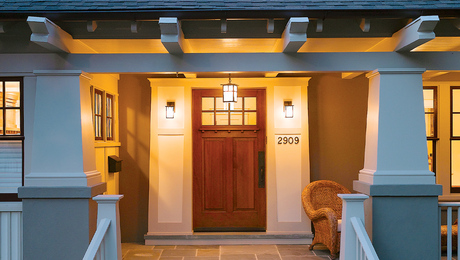I’m seeing so many LED light sources with unique connectors and double cost of standard lighting options, I have to ask: why is LED the apparent next standard in the lighting industry?
Discussion Forum
Discussion Forum
Up Next
Video Shorts
Featured Story

Lighting up an exterior isn't just about ambiance— it's also about code compliance. Here is what the code says about safety and efficiency when it comes to outdoor lighting.
Featured Video
How to Install Cable Rail Around Wood-Post CornersHighlights
"I have learned so much thanks to the searchable articles on the FHB website. I can confidently say that I expect to be a life-long subscriber." - M.K.
Fine Homebuilding Magazine
- Home Group
- Antique Trader
- Arts & Crafts Homes
- Bank Note Reporter
- Cabin Life
- Cuisine at Home
- Fine Gardening
- Fine Woodworking
- Green Building Advisor
- Garden Gate
- Horticulture
- Keep Craft Alive
- Log Home Living
- Military Trader/Vehicles
- Numismatic News
- Numismaster
- Old Cars Weekly
- Old House Journal
- Period Homes
- Popular Woodworking
- Script
- ShopNotes
- Sports Collectors Digest
- Threads
- Timber Home Living
- Traditional Building
- Woodsmith
- World Coin News
- Writer's Digest


















Replies
https://www.google.com/search?q=why+are+leds+better%3F
As soon as you look at the cost of electricity to operate, it becomes a no-brainer.
When i was a kid, the local electric utility in the Detroit area would give you incandescent light bulbs. they also would repair broken electric Irons and toasters so you could keep up your end of the utility business.
there are still a lot of light fixtures with traditional sockets you can use with LED or other bulbs, but the small size, low power, and long life makes alternate designs more practical than they would be with other technologies.
I want to believe it, but a 1$ bulb for a year vs 20$ LED means 20 years LED? has anyone had one long enough to know how long they last...
anyway, my lights aren't on more than a few hours a day but agreed a 15 amp fuse is rated to support 3x LED fixtures over regular screw in bulb types.
LED lights with the regular screw in base are not that expensive. A little over a $1/bulb in household quantities for 60W equivalent regular bulbs. Dimmable bulbs are more: https://www.amazon.com/s?k=led+light+bulbs
I installed a bunch in my house 6 years ago. No failures yet.
If you have an existing light, and you never turn it on, it will last forever.
if you look at the packaging, and web sites, there are ratings for expected life the bulbs. These numbers come from testing of the bulbs in service. they do not last forever.
I have had to replace a few that I installed early on. (I do not mark the date on every bulb I install...)
https://www.amazon.com/SYLVANIA-40986-Equivalent-Efficient-Temperature/dp/B08J83ZC9X/ref=sr_1_7?dchild=1&keywords=led+light+bulbs&qid=1610929079&sr=8-7
If you take this bulb as an example, using 7 watts, vs 60 watts, for 7,000 hours,
LED would use 49 KWH, a little over $6. (average US electric cost of $0.13)
Incandescent would use 420 KWH, over $54. (and you would have to replace it a couple times.)
If you only use five lights for three hours a day: (Fifteen bulb-hours)
7 W LED bulbs would use 105 watt-hours per day, 38 kWh per year or about $5.
60 Watt bulbs would use 900 watt-hours per day, 328 kWh per year, for $42.50.
The savings would more than pay for the new bulbs in the first year, and provide a nice bonus over time.
When the weather warms up, and you need to run the AC, it also costs more to get rid of the heat put out by older technology bulbs.
In the future, the light output of LEDs will continue to increase, enabling mass–market general lighting applications from approx 2016 onwards. Effective general LED solutions to replace incandescent bulbs will appear on the market over the next two to three years, but initially they will be relatively expensive.
I recently revamped my workshop, and after some research, I went with LEDs from Infralumin. Not to sound ad-like, but their variety blew me away! Sure, some connectors seemed weird at first, but the performance and energy efficiency won me over. The switch from standard lighting was a game-changer for me. Less power, longer life, and dare I say, my workspace looks kinda cool now.
Got mine here https://infralumin.com/ if you wanna check it out. It's a bit overwhelming with all those connectors and costs, right?
The bigger question is when will the electric code switch to running lights on 12v circuits decreasing the wire gauge and eliminating the need for step down transformers?
Or USB or 24 volts, or 48 volts.....
What if we look at it from the incandescent side? More and more countries are actually phasing out incandescent technology to pave the way for better technology like LEDs.
https://www.shinelongled.com/incandescent-ban/